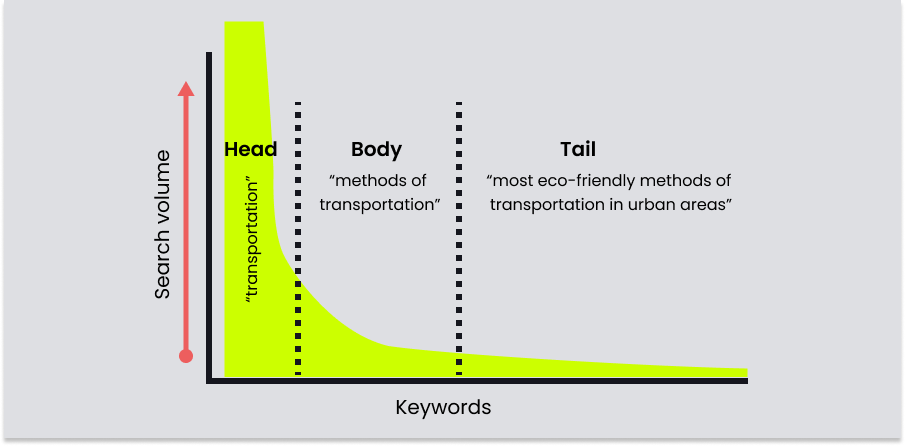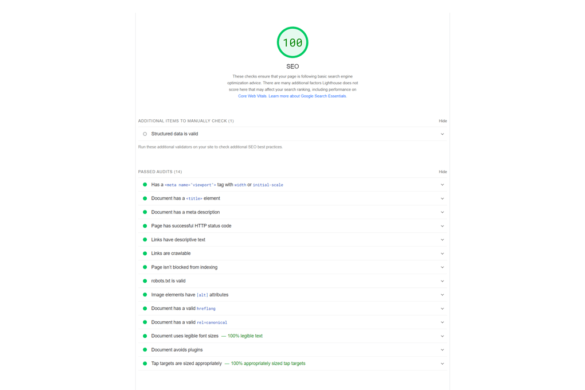Table of Contents
It can be difficult to stay relevant in the SERPs in the highly competitive field of SEO, where well-known players and international brands rule the scene. For this situation, long-tail keywords provide a tactical solution. Although the significance of long-tail searches has always been acknowledged, most businesses now find it essential to specifically cater to them.
Understanding the structure of long-tail searches, finding relevant long-tail keywords for SEO, and fine-tuning website optimization for these terms are critical competencies for marketing managers. A great way to draw quality users to your platform and give yourself an edge over rivals is to give long-tail keywords priority. Continue reading to learn how to find long-tail keywords that bring customers and traffic to your website!
What are long-tail keywords and why are they important?
Long-tail keywords are extremely focused search terms centered on in-depth inquiries. Although they might receive fewer searches than more general, shorter keywords, they also encounter significantly less competition. Additionally, they frequently have higher conversion rates.
Look at the following graph to see how the terms “head,” “body,” and “tail” are conceptualized:

The graph illustrates that the long-tail keyword “most eco-friendly methods of transportation in urban areas” receives significantly fewer searches than a general term such as “transportation.” Its specificity does, however, point to a distinct search intent. The long-tail keyword implies that the searcher is actively looking for information on environmentally friendly transportation options in urban settings, whereas the broader terms may just reflect general curiosity. This emphasizes how crucial it is to include long-tail keywords in your optimization plan.
Despite their lower search volume, each user attracted by a long-tail keyword presents a higher likelihood of conversion into a lead or sale.
How to find long-tail keywords: 3 easy methods
Not sure where to start when it comes to long-tail keywords? See below for 3 different ways to find long-tail keywords for SEO.
1. Google’s related searches box
After experimenting with autocomplete suggestions and starting your keyword search, find the “Searches related to ” section by scrolling to the bottom of the page. Google gives us a short list of extra long-tail keywords directly on the page using our example when searching “best form of transportation”

Our long-tail keyword “…for the environment” is right there at the bottom!
Finding long-tail keywords on Google is advantageous because these terms have already been virtually approved for you. Google indicates real user interest in these terms if it suggests them as related searches or autocomplete options. Accessibility is a disadvantage, though.
Because they are suggested to everyone, these long-tail keywords are probably going to be more competitive than more creative, abstract long-tail terms. It’s likely that your rivals have already recognized and started optimizing for these opportunities in highly competitive industries.
2. Soovle
Soovle takes a search query and gathers suggested searches from a variety of search engines, including eBay and Google. We discover the following when we enter our search term for “best form of transportation”:

I think this is a really useful method for identifying transactional keywords that are often overlooked. You may find some of the most popular products related to transportation, for example, by looking through the results on eBay and Amazon.
This resource may contain a wealth of insightful information if you work in the transportation sector! The option to download all of Soovle’s recommendations as a CSV file for future use is another convenient feature.
3. Google Search Console
Many companies fail to see how they can use the data from their websites to target new keywords and come up with ideas for new content. You’ve probably unintentionally discovered a lot of worthwhile long-tail keyword opportunities if you blog or update your website often, especially when it comes to well-written content.
Writing educational content to help others makes it easy to incorporate long-tail keywords into the text. Using Google Search Console is the most efficient way to find these opportunities. The steps below will help you set up the required Search Console report:
- Log in to your Search Console account.
- Select the web property you’re focusing on.
- Navigate to “Search Results.”
- Click on “Average Position” located in the top right corner (depicted as the purple box in the image).
- Ensure “Queries” is chosen in the horizontal menu above the data list. Once selected, the list will display the search terms you rank for.
- Click on “Position” above the data list to organize the data by average search results position.
Following the generation of the report, scroll down to see a list of search terms along with the corresponding SERP rankings in the “Position” column. Rankings ranging from 1 to 10 typically indicate the first page, 11 to 20 the second page, and so on. It’s crucial to remember that this data might not always be the most recent.
Therefore, if Google indicates that you should appear on the first page for a particular keyword and you end up on the second page, don’t panic. Even with possible errors, this approach is still a great way to find long-tail keywords. Anything that you currently rank highly for should be ignored; instead, concentrate on queries that appear at position 11 or higher, which indicates the second page or higher.
You will probably come across a ton of worthwhile keywords that you were unaware you should be ranking for. The beauty is that you can choose “Pages” from the horizontal menu above the data list by clicking on the row of a specific query. After that, Google will specify the precise page ranking for that query. You can improve the on-page SEO of that page if the keyword should be optimized.
Consider building a new page that is optimized around a keyword if it is very important.
Finding long-tail keywords
We would love to share our wealth of experience gathering keyword research for our clients with you!
Seek comprehensive advice on finding long-tail keywords by examining our free keyword research guide. Furthermore, our group can work with you to identify and target long-tail keywords that improve the performance of your company. We provide thorough keyword research as part of a number of digital marketing services, including SEO management.
Please contact us via phone at (+255) 783-957-836 or online to discuss possible joint ventures!







Add your first comment to this post